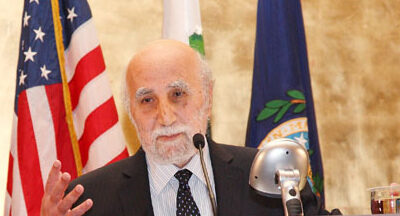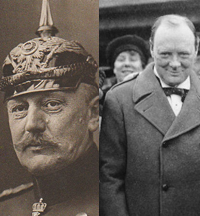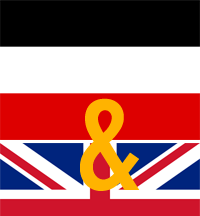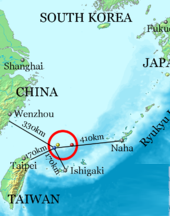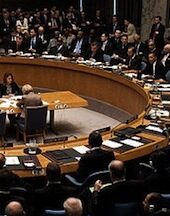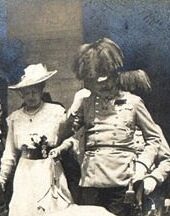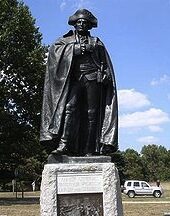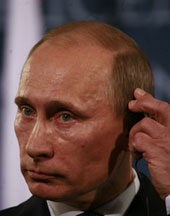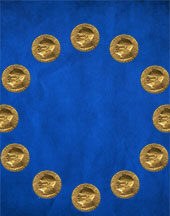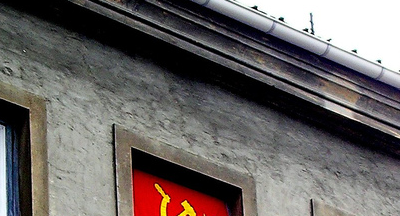Author
Martin Sieff

Book author and former foreign editor
Martin Sieff is the author of “The Politically Incorrect Guide to the Middle East” (Regnery, 2008), “Shifting Superpowers: The U.S.-China-India Relationship in the 21st Century” (Cato, 2009) and the upcoming “Cycles of Change: The Eras of U.S. Political History” and “War and Peace in the 21st Century.”
Previously, Mr. Sieff was chief news analyst for United Press International and its former Managing Editor for International Affairs. He has received three Pulitzer Prize nominations for international reporting.
Mr. Sieff has covered conflicts in his native Northern Ireland, Israel and the West Bank, Indonesia, Bosnia, Azerbaijan, Georgia and the Baltic states. He has also reported from China, India, Pakistan, Bangladesh, Kazakhstan, Japan, Malaysia, Singapore, Syria, Egypt, Jordan, Kuwait, Turkey and more than 40 other nations.
Mr. Sieff led UPI’s political coverage of the 2000, 2004 and 2008 presidential election campaigns. From May 2005 to July 2007 he was UPI’s National Security Correspondent, and from October 2003 to May 2005 he was its Chief Political Correspondent.
Mr. Sieff was Chief Foreign Correspondent for The Washington Times from 1994 to 1999. He was the paper’s Soviet and East European correspondent covering the collapse of communism for six years from 1986 to 1992 and from 1992 to 1994 its State Department correspondent.
Mr. Sieff was a columnist for The Globalist between 2002 and 2014 and has appeared as an expert on Asian security affairs and the Middle East on National Public Radio, the Fox News Channel and C-SPAN. His work has been published in The American Conservative, the Wall Street Journal, Commentary, National Review and National Review Online and many other publications.
A native of Belfast, Northern Ireland, Mr. Sieff was a journalist for the Belfast Telegraph and the Belfast News-Letter in the early 1980s.
Mr. Sieff received his B.A. and M.A in modern history from Oxford University. He later did graduate work in Middle East studies at the London School of Economics.
Articles by Martin Sieff
1814 or 1914? The Fateful Choice in 2014
The surprising way in which historical choices present themselves in cycles that are 100 years apart.
July 4, 2014
America’s False Middle East Prophet
Venerated Fouad Ajami built his true legacy on falsehoods and foolishness.
June 30, 2014
Who Lost Iraq? Inside an American Battle
Why are the U.S. media not holding U.S. officials responsible for Iraq's destruction?
June 25, 2014
The British Empire’s Lesson for Modern America
Why the U.S. strategy to remake Afghanistan after 9/11 was bound to fail.
May 28, 2014
Obama’s Whitewashed History
Putin is no saint, but he simply revived Russia's own version of the U.S. Monroe Doctrine.
April 3, 2014
Russia: Pushing Back at the United States
Looking at Russia's recent actions in a historical context.
April 3, 2014
Churchill: Architect of Catastrophe, 1914
How a legendary politician needlessly took Britain into a continental war in 1914.
February 22, 2014
Moltke: Architect of Catastrophe, 1914
How one general accidentally plunged Germany into a ruinous war in 1914.
February 22, 2014
Alternate History: Had King Lived
Imagining the America and the World that Martin Luther King could have built.
January 25, 2014
Japan Must Own Up to Past Actions
Diaoyu Islands: China's posture reflects Japan's failure to show contrition for the past.
January 10, 2014
Israel’s Rommel and Vietnam’s Napoleon
What can the lives and victories of top generals of Israel and Vietnam teach the U.S. Army?
October 13, 2013
Why the UN Security Council Still Matters
Putin's Russia now takes the United Nations Security Council far more seriously than the U.S. government does.
September 25, 2013
Germerica: The German Love Affair with America
What tied Germany and the United States together for over two centuries?
August 29, 2013
Thatcher Lives! In Putin’s Moscow
Can you track the many ways in which Russia's President and the UK's late Prime Minister were alike?
April 19, 2013
State of Dis-Union: American Clanistan
Can the trend toward more factionalism, tribalism and fragmentation in American political life be reversed?
February 12, 2013
America’s Bismarck: How Lincoln Created Industrial America
Do Americans — who have a conflicted attitude toward government — realize the economic power that Abraham Lincoln wielded?
January 17, 2013
Elections of Destiny: Reagan in 1980 and Gladstone in 1880
How did the U.S. election of 1980 and the British election a century prior lay the groundwork for each country's decline?
November 6, 2012
Europe’s Nobel and the Sine Wave of War
The European Union's Nobel Peace Prize doen't ensure peace in the future.
October 17, 2012
The Unfashionably Successful Mr. Putin
Why might Vladimir Putin prove to be a prescient and well-prepared guide for his nation?
March 1, 2012
David Cameron: Embracing Europe in Churchill’s Footsteps
Is David Cameron following in the footsteps of Churchill and Thatcher by balancing anti-Europe sentiment against pro-Europe cooperation?
February 21, 2012
Seven Billion Humans: The World Fritz Haber Made
How did the German-Jewish chemist Fritz Haber revolutionize the entire course of world history?
November 2, 2011
A Transatlantic Reversal of Fortune
Is America's optimistic spirit of renewal more likely to reassert itself in Brussels than in Washington?
October 25, 2011
Lessons for Libya from 1911
What is the key to the success of democracy in 21st century Libya?
September 6, 2011
Britain’s Tabloid Cancer
How have the British paid a steep price for their appetite for gossip and the unnecessary details of grizzly crimes?
August 10, 2011
How Qaddafi Mastered the Globalization Game
What has enabled Libyan leader Muammar Qaddafi to weather North Africa's tsunami of popular revolutions?
April 18, 2011
2011: Where’s the Space Odyssey?
Why is the U.S. space program shying away from its ambitious missions of the past?
April 14, 2011
The Hard Realities of the Need for More Oil
Why are oil prices going to stay high — and climb higher?
March 30, 2011
Will Central Asia Follow Egypt’s Example?
Will the chain reaction of protests crossing the Middle East now reach Central Asia?
February 16, 2011
Will Egypt Today Share the Fate of Turkey in 1911?
Why are the parallels between Cairo today and Constantinople a century ago all too obvious and disturbing?
February 2, 2011
Haiti: Aid in a Time of Cholera
Why has outsourcing disaster relief work to NGOs failed in the case of Haiti's cholera outbreak?
December 16, 2010
FIFA Scores Two Goals for Globalism
Are the British just being sore losers in protesting their loss of the 2018 World Cup to Russia?
December 14, 2010
The U.S., Kazakhstan and Stresses of Empire
How has the Obama Administration bungled U.S. relations with Kazakhstan?
July 29, 2010
CNOOC-ering BP
Could BP soon fall into the hands of CNOOC, the China National Offshore Oil Corporation?
June 18, 2010
Georgia: An Insecure Foothold for the United States
Do the lessons of history suggest the United States should rethink its Georgia policy?
June 2, 2010
Billionaires for U.S. Financial Reform
What can President Obama learn from FDR's success in reforming Wall Street 75 years ago?
February 4, 2010
The Myth of Permanent U.S. Global Dominance
What mistakes have U.S. policymakers made when dealing with China and India?
January 22, 2010
Anglicans: A Hostile Takeover From the Continent?
Why do the Vatican's policymakers believe the Church of England is in Chapter 11?
November 4, 2009
News of the Future: Running Hillary
How can Barack Obama win his 2012 re-election campaign?
November 2, 2009
Goldman Sachs and "War Profiteering"
How has Goldman Sachs discredited capitalism in ways that Marx and Lenin would gleefully applaud?
October 22, 2009
Ireland Says "Thank You" to Europe (Part II)
In what ways has Ireland's EU membership proved crucial to the achievement of peace on the island?
October 9, 2009
Ireland Says “Thank You” to Europe (Part I)
How has membership in the European Union benefited Ireland over the past few decades?
October 8, 2009
Dublin Swings
After several remarkable years of economic growth, is Dublin the same old city it used to be?
March 7, 2005
Learning From Saudi Arabia
Is Saudi Arabia doing more than it is getting credit for?
January 6, 2005
North Korea: The Bee Comes Stinging
Have the Pentagon's warnings about North Korea been ignored for years?
September 8, 2003
What Tony Blair Never Told George W. Bush
Should the Bush Administration have studied Iraqi history before attempting to democratize it?
September 4, 2003
The British Colossus
Has the nature of London changed — or stayed the same over the last 100 years?
August 18, 2003
Bush As Churchill?
Are comparisons between George W. Bush and Winston Churchill justified?
March 3, 2003
2003 and Still No Space Odyssey
Is the U.S. space program shying away from its ambitious missions of the 1960s and 1970s?
February 8, 2003
Columbia and Historic Omens
Can great tragedies serve as omens for dramatic changes in world affairs?
February 4, 2003
The Pentagon's House Philosopher
Just who is influencing the Pentagon's office politics?
November 27, 2002
Is Washington Becoming Versailles?
What does 21st-century Washington have in common with 17th-century France?
October 17, 2002
Divvying Up the Spoils of Iraq — The Pentagon's Vision
What might Washington have in store for a post-Saddam Iraq?
September 12, 2002
1814 or 1914? The Fateful Choice in 2014
July 4, 2014
America’s False Middle East Prophet
June 30, 2014
Who Lost Iraq? Inside an American Battle
June 25, 2014
The British Empire’s Lesson for Modern America
May 28, 2014
Obama’s Whitewashed History
April 3, 2014
Russia: Pushing Back at the United States
April 3, 2014
Churchill: Architect of Catastrophe, 1914
February 22, 2014
Moltke: Architect of Catastrophe, 1914
February 22, 2014
Alternate History: Had King Lived
January 25, 2014
Japan Must Own Up to Past Actions
January 10, 2014
Israel’s Rommel and Vietnam’s Napoleon
October 13, 2013
Why the UN Security Council Still Matters
September 25, 2013
Germerica: The German Love Affair with America
August 29, 2013
Thatcher Lives! In Putin’s Moscow
April 19, 2013
State of Dis-Union: American Clanistan
February 12, 2013
America’s Bismarck: How Lincoln Created Industrial America
January 17, 2013
Elections of Destiny: Reagan in 1980 and Gladstone in 1880
November 6, 2012
Europe’s Nobel and the Sine Wave of War
October 17, 2012
The Unfashionably Successful Mr. Putin
March 1, 2012
David Cameron: Embracing Europe in Churchill’s Footsteps
February 21, 2012
Seven Billion Humans: The World Fritz Haber Made
November 2, 2011
A Transatlantic Reversal of Fortune
October 25, 2011
Lessons for Libya from 1911
September 6, 2011
Britain’s Tabloid Cancer
August 10, 2011
How Qaddafi Mastered the Globalization Game
April 18, 2011
2011: Where’s the Space Odyssey?
April 14, 2011
The Hard Realities of the Need for More Oil
March 30, 2011
Will Central Asia Follow Egypt’s Example?
February 16, 2011
Will Egypt Today Share the Fate of Turkey in 1911?
February 2, 2011
Haiti: Aid in a Time of Cholera
December 16, 2010
FIFA Scores Two Goals for Globalism
December 14, 2010
The U.S., Kazakhstan and Stresses of Empire
July 29, 2010
CNOOC-ering BP
June 18, 2010
Georgia: An Insecure Foothold for the United States
June 2, 2010
Billionaires for U.S. Financial Reform
February 4, 2010
The Myth of Permanent U.S. Global Dominance
January 22, 2010
Anglicans: A Hostile Takeover From the Continent?
November 4, 2009
News of the Future: Running Hillary
November 2, 2009
Goldman Sachs and "War Profiteering"
October 22, 2009
Ireland Says "Thank You" to Europe (Part II)
October 9, 2009
Ireland Says “Thank You” to Europe (Part I)
October 8, 2009
Dublin Swings
March 7, 2005
Learning From Saudi Arabia
January 6, 2005
North Korea: The Bee Comes Stinging
September 8, 2003
What Tony Blair Never Told George W. Bush
September 4, 2003
The British Colossus
August 18, 2003
Bush As Churchill?
March 3, 2003
2003 and Still No Space Odyssey
February 8, 2003
Columbia and Historic Omens
February 4, 2003
The Pentagon's House Philosopher
November 27, 2002
Is Washington Becoming Versailles?
October 17, 2002
Divvying Up the Spoils of Iraq — The Pentagon's Vision
September 12, 2002

